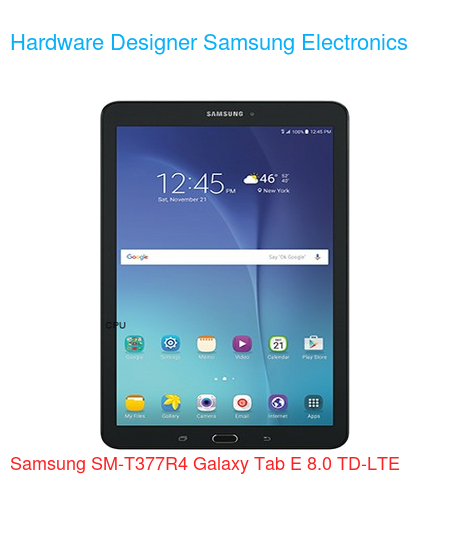| Brand | Samsung |
| Model | SM-T377R4 Galaxy Tab E 8.0 TD-LTE |
| Released | 2015 Nov 19 |
| Hardware Designer | Samsung Electronics |
| Manufacturer | Samsung Electronics |
| Device Category | Tablet |
| Width | 126 mm |
| Height | 221 mm |
| Depth | 8.9 mm |
| Dimensions | 4.96×8.70×0.35 inches |
| Platform | Android |
| Operating System | Google Android 5.0.2 (Lollipop) |
| CPU Clock | 1200 MHz |
| CPU | Qualcomm Snapdragon 410 MSM8916, 2014, 64 bit, quad-core, 28 nm, Qualcomm Adreno 306 GPU |
| RAM Type | Yes |
| RAM Capacity (converted) | 1.5 GiB RAM |
| Non-volatile Memory Interface | eMMC 4.5 |
| Non-volatile Memory Capacity (converted) | 16 GB ROM |
| Display Diagonal | 203 mm |
| Resolution | 800×1280 |
| Horizontal Full Bezel Width | 18.41 mm |
| Display Area Utilization | 66.5% |
| Pixel Density | 189 PPI |
| Display Type | Color TN-TFT LCD display |
| Number of Display Scales | 16.8M |
| Scratch Resistant Screen | No |
| Graphical Controller | Qualcomm Adreno 306 |
| Dedicated Graphics Memory | 0.125 MiB |
| A/V Out | No |
| Microphone(s) | mono |
| Loudspeaker(s): | mono |
| Audio Output: | 3.5mm |
| Supported Cellular Bands | CDMA800 (BC0) , CDMA1900 (BC1/BC14) , LTE1900 (B2) , LTE1700/2100 (B4) , LTE850 (B5) , LTE700 (B12) , LTE700 (B17) , LTE1900 (B25) bands |
| Supported Cellular Data Links | cdmaOne , CDMA2000 1x , CDMA2000 1xEV-DO Rev A , LTE , LTE 150/50 data links |
| Complementary Phone Services | Vibrate |
| SAR (body) | 1.080 W/kg |
| 2nd highest SAR (body) | 1.100 W/kg |
| Sec. Supported Cellular Networks: | No |
| Touchscreen Type | Capacitive multi-touch screen |
| Expansion Interfaces | TransFlash , microSD , microSDHC , microSDXC |
| USB | USB 2.0 |
| USB Services | USB charging |
| USB Connector | USB Micro-B (Micro-USB) |
| Bluetooth | Bluetooth 4.0 |
| Wireless LAN | 802.11a , 802.11b , 802.11g , 802.11n |
| Wireless Services | DLNA , Wi-Fi Direct , Wi-Fi Tethering |
| FM Radio Receiver | No |
| Complementary Satellite Services | A-GPS , Geotagging , QuickGPS |
| Supported GLONASS protocol(s) | L1OF |
| Camera Placement | Rear |
| Camera Image Sensor | CMOS |
| Number of effective pixels | 5.0 MP camera |
| Zoom | 1.0 x optical zoom |
| Focus | CD AF |
| Flash | No |
| Aux. Camera Image Sensor | No |
| Aux. 2 Camera Image Sensor | No |
| Aux. 3 Camera Image Sensor | No |
| Aux. 4 Camera Image Sensor | No |
| Secondary Camera Placement | Front |
| Secondary Camera Sensor | CMOS |
| Secondary Camera Number of pixels | 1.9 MP sec. cam |
| Sec. Aux. Cam. Image Sensor | No |
| Built-in compass | Yes |
| Built-in accelerometer | Yes |
| Built-in gyroscope | Yes |
| Additional sensors | L sensor |
| Protection from solid materials | Yes |
| Protection from liquids | Yes |
| Battery | Li-ion |
| Market Countries | USA |
| Mobile Operator | United States Cellular Corporation |
| Added | 2024-06-26 |
Specifications data description of this 📱Samsung SM-T377R4 Galaxy Tab E 8.0 TD-LTE📱
Title: The Ultimate Specification Guide for Your Device 🌐📅🏋️🌈🤖🛠️🚀
Introduction:
Welcome, tech enthusiasts! In this blog post, we will delve into the fascinating world of device specifications. We will explore various aspects of a device that make it unique and powerful. From the robust chipset to the vibrant display and long-lasting battery, we will cover it all. So grab a cup of coffee, and let’s dive in!
Lineup:
In this section, we’ll look at the different devices available in the market and what makes each one stand out. From the sleek design of the latest smartphones to the compact size of portable devices, there’s a lot to explore.
Design:
Design plays a critical role in a device’s success. A well-designed device can make all the difference when it comes to user experience. The design of a device includes factors such as ergonomics, aesthetics, and build quality. A device that’s easy to hold, looks great, and feels sturdy is always a winner.
Specifications:
Now, let’s dive into the nitty-gritty of device specifications. Here’s what you need to know:
🛠️ Chipset: A device’s chipset is its brain. It powers all the functions of the device, from gaming to browsing. Look for a powerful chipset that ensures smooth and efficient performance.
🚀 CPU: A device’s CPU (Central Processing Unit) is its primary processor. A fast CPU means a device can handle multiple tasks simultaneously without any lag.
🖥️ GPU: A device’s GPU (Graphics Processing Unit) is responsible for rendering visuals. If you’re into gaming or high-definition video playback, look for a powerful GPU.
🧠 MEMORY: A device’s memory (RAM) plays a crucial role in its overall performance. More RAM means more multitasking capabilities and faster data processing.
📷 CAMERA: A good camera is a must-have for many users. Look for a device with a high-resolution camera, optical image stabilization, and other features such as night mode, slow-motion video, and portrait mode.
🎮 SOUND: A device’s sound quality is often overlooked, but it’s essential for a great user experience. Look for devices with high-quality speakers, Dolby Atmos support, and other sound-enhancing features.
📡 COMMS: A device’s communication capabilities are essential in today’s interconnected world. Look for devices that support fast and reliable connectivity options such as Wi-Fi 6, Bluetooth 5.0, and 5G.
💡 FEATURES: Features such as biometric authentication, water resistance, and wireless charging are increasingly becoming standard on devices. Look for devices with features that are important to you.
🔋 BATTERY: A device’s battery life is a significant factor to consider. Look for devices with long-lasting batteries that can last a full day of heavy usage.
Conclusion:
We’ve covered a lot of ground, and we hope you found this post informative. As you can see, there are many factors to consider when choosing a device. The specifications of a device can make all the difference in how it performs and feels.
We invite you to leave a comment and share your thoughts. What features are most important to you when choosing a device? Do you have a favorite device that you’d like to share with us? We’d love to hear from you!














